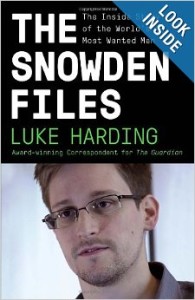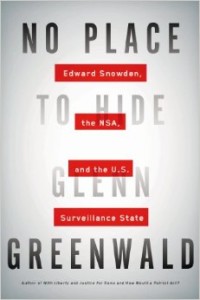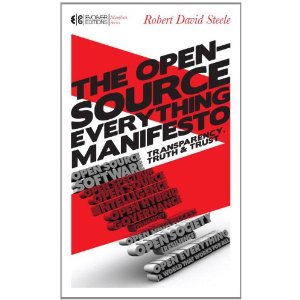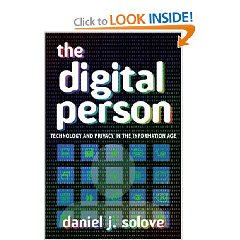
Luke Harding
![]() Ed Snowden and the American tribal fear meme, February 19, 2014
Ed Snowden and the American tribal fear meme, February 19, 2014
This is a story about what one American saw atop the tip of an iceberg called the “American national security state.” In the end, Ed Snowden, a 29-year old, $200,00/year High School dropout turned Computer Systems Administrator for Dell, and then Booz Allen Hamilton, both of which were under contract with the NSA, is little more than a proxy for the rest of us: the “paying customer” zombies and drones for the American “national security state.”
As he tried to “ride out” his tenure astride this violently bucking institutional Orwellian Frankenstein, Snowden quickly realized that he was losing ground to this secret self-fashioned protector of America's deepest values. In our life time, the NSA had joined a long string of other self-justifying, self-certifying, security institutions, like the CIA, the FBI, Swat Teams, the DEA, even local police intelligence units, especially in America's inner cities. In our lifetime, these institutions have acquired immense and unwarranted powers, often even unauthorized, unconstitutional and unearned and even criminal influence over our democratic institutions. Today, as this evolving behemoth huffs and puffs and bucks wildly out-of-control, Snowden decided he had no choice but to “jump ship,” taking with him a treasure trove of all that lay below the national security waterline.
What exactly is it that Ed Snowden saw that frightened him out of his wits and out of his $200k job and into the hands of a most curious savior of last resort: Vladimir Putin's Russia, the ex-Communist ex-superpower that, since it was forced to commit suicide as an empire, has now become a capitalist Wild West frontier, a land full of out-of-control oligarchs, which is exactly where Ed Snowden's favorite political hero, Ron Paul would like to take America — if he is ever elected president, that is.
As he now sits ensconced somewhere in Russia, one thought above all else must have occurred to Mr. Snowden: Is this some kind of sick joke? That me, a freedom-loving American, who willingly exercised my civic duty as a free-thinking defender of American values and the U.S. Constitution, conveying crimes being committed against that very Constitution, is now forced to run, hide and seek refuge in a failed ex-Communist state?
That Snowden's reality is true in a nation that is still living on moral credit, and that takes much more credit for being democratic than it deserves or its historical record can substantiate, is almost as embarrassing an irony and contradiction as seeing the U.S. being “in hock up to the hilt” to Reagan's other Axis-of-evil: the last standing Communist Police State, “Red China.” And lest we conveniently forget, said “Red China,” is the same state that less than three decades ago, we were referring to mockingly and derisively as being backwards? Now, that they are in bed with our capitalist oligarchs (the Red Chinese “Job Creators,” par excellence) rather incongruously, China has now become the world's leading capitalist country, holding 60% of our debt, while the U.S. slides noisily, defiantly, but nevertheless persistently and decidedly, backwards. There is an embedded poetic logic to this irony that Snowden's Ron Paul-Ayn Rand Libertarian sensibilities seems to have missed?
This book rather inarticulately unravels the story of exactly what it is that Ed Snowden saw; why he was so alarmed; and why he had no choice but to expose what he saw to the American public and then had to run. It tells how in the ultimate act of patriotic suicide, Snowden had to respectfully sue for the mercy of the “Obama Courts.” However, since he knew that with the “Obama Justice Department,” a fair trial was already off the table, he had no choice but to “punt early” by “going on the lam,” and seeking protection and a haven elsewhere.









